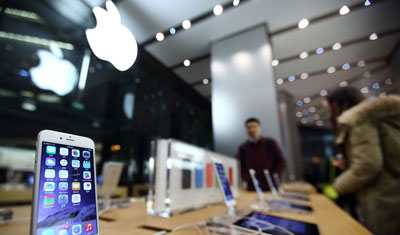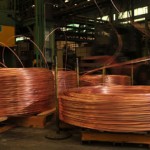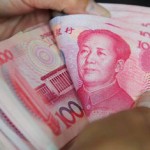Chinese economy concerns wipe $40bn off value of Apple

Fall in share price of world’s biggest company mirrored by slide in stocks in mining and commodity firms to their lowest level since market crash of 2008
Growing concerns about the health of the Chinese economy helped wipe $40bn off the value of Apple on Wednesday despite the company reporting a sharp increase in global sales and profits.
The 5% fall in share price in the world’s biggest company was mirrored by a slide in shares in mining and commodity firms to their lowest levels since the stock market crash of 2008. Investors regard the mining and commodities industries as vulnerable to a slowdown in the world’s second biggest economy.
Oil, gold, zinc, copper and platinum prices were all down on a day when markets were dominated by second quarter results from Apple that showed strong growth but were less impressive than dealers had been anticipating.
Despite a doubling of sales of iPhones to China’s growing middle class over the past year, financial markets fear the recent official Chinese figures showing economic growth of 7% are exaggerated and that consumer demand may flag in the coming months.
The consultancy firm Oxford Economics said alternative measures showed Chinaexpanding at between 4-5%, while analysts at broker Cowen pointed to “evidence of a widespread demand reset from China” as they downgraded their forecasts for Apple’s prospects.
The Chinese stock market has been focus of world attention in recent weeks after a collapse beginning in mid-June that prompted companies to suspend their shares to prevent even more precipitous declines. Retail investors – an estimated 90 million of them – had poured into the market, which has fuelled concerns that their losses may reduce their ability to generate demand for products in the future.
Weaker exports from emerging markets, including China, were the main factor behind a 1.2% monthly fall in world trade volumes in May. The decline is part of a recent sluggish trend that has convinced some economists that globalisation has stalled in recent years.
Commodity prices have been supported by the rapid industrialisation of China, but policymakers in Beijing have been trying to slow the economy and make its growth better balanced. Copper prices were trading on Wednesday at almost their lowest level in almost six years, while US oil prices dipped to $50 a barrel. Analysts know the metal as “doctor copper” for its ability to reflect the underlying state of the global economy.
Analysts at Goldman Sachs, said: “It is, in our view, highly likely that the four-year trend decline in copper prices is set to continue through at least 2018.” The Bloomberg commodities index hit a 13-year low.
Tim Cook, Apple’s chief executive, said he remained upbeat about prospects for China, but disappointed analysts by refusing to give details of sales of the Apple Watch, which was launched in April. In the past, Cook has emphasised the importance of Chinese growth to Apple’s future growth.
In London, ARM Holdings, which supplies chips for the tech company’s products, was the biggest faller in the FTSE 100, which closed 101 points (1.5% lower) at 6667. The index was also dragged lower by share falls in mining companies, with Glencore and BHP both down sharply and Anglo American at its lowest price since 2002, surpassing the lows reached during the depths of the global banking crisis recession seven years ago.
Although sales of iPads continued their decline of the past 18 months, Apple reported its largest ever cash pile of $203bn, a 33% rise in annual revenues and a 37% increase in year-on-year profits. But it still managed to disappoint Wall Street, and because of the company’s sheer size, the Dow Jones industrial average closed almost 70 points down.
At one point Apple’s stock market value had fallen by almost $60bn as investors weighed up the prospects for a company which has usually beaten even the most optimistic forecasts.
“World trade volumes for both goods and services have risen by less than global GDP over the past four years,” said economists at UBS. “This is an unprecedented outcome in postwar history. There are few signs moreover that global trade growth is picking up, despite evidence that suggests activity in the US and the eurozone is accelerating.”
Financial markets are anticipating the first increase in US interest rates from the Federal Reserve later this year, a move seen likely to lead to investors pulling their money out of emerging markets and adding to their economic problems.
Source: The Guardian – Chinese economy concerns wipe $40bn off value of Apple





























